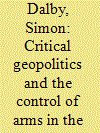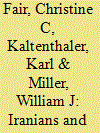| Srl | Item |
| 1 |
ID:
104994


|
|
|
|
|
| Publication |
2011.
|
| Summary/Abstract |
Critical geopolitics is about challenging the taken for granted contextualizations of social phenomena on the large scale. Invoking insights from this burgeoning literature, this paper examines some of the key taken for granted geopolitical specifications in the discussion of arms control. In particular the case of the new Strategic Arms Reduction Treaty between the United States and Russia, and the persistent discourses of Iranian threat are formulated within some obvious, but very important geographical premises. The possibilities of innovations in the structure of the world order cannot ignore how desirable futures are rhetorically mapped, any more than they can avoid the question of who controls which arms where, in that order. Geography is never innocent, and the analysis in this paper suggests caution is appropriate when assuming the efficacy of particular contextualizations in both academic analysis and policy prescription.
|
|
|
|
|
|
|
|
|
|
|
|
|
|
|
|
| 2 |
ID:
124252


|
|
|
|
|
| Publication |
2013.
|
| Summary/Abstract |
A 2008 poll of Iranians revealed that approximately twenty-four percent of those surveyed support the development nuclear weapons by Iran, while seventy-four percent of those surveyed support the development of exclusively peaceful nuclear capabilities. This essay develops an argument that explains why Iranians hold different views on nuclear weapons. We contend that the elite discourse on the legitimacy of nuclear weapons within a nation will play a very large role in shaping public attitudes on the development of such weapons. In post-revolution Iran, ruling elites have invoked Islam to shape the discourse on nuclear weapons, and top clerics have argued that Islam forbids the development of such weapons. Thus we would expect that acceptance or rejection of this view of nuclear weapons will be the primary factor explaining an Iranian's support for or opposition to their development. Our regression analyses indicate that a respondent's views on whether Islam tolerates the development of nuclear weapons explain, in large measure, the observed variation in Iranian support for developing nuclear weapons.
|
|
|
|
|
|
|
|
|
|
|
|
|
|
|
|
| 3 |
ID:
105533


|
|
|